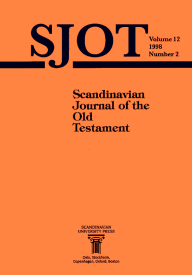 | |
| Discipline | Biblical studies |
|---|---|
| Language | English |
| Edited by | Ingrid Hjelm and Emanuel Pfoh |
| Publication details | |
| History | 1985-present |
| Publisher | |
| Frequency | Biannual |
| Standard abbreviations | |
| ISO 4 | Scand. J. Old Testam. |
| Indexing | |
| ISSN | 0901-8328 (print) 1502-7244 (web) |
| LCCN | sn88021685 |
| OCLC no. | 16313081 |
| Links | |
The Scandinavian Journal of the Old Testament is a biannual peer-reviewed academic journal covering aspects of the Hebrew Bible. It was established by Niels Peter Lemche (University of Copenhagen) [1] and Knud Jeppesen. [2] As per 2024, Ingrid Hjelm and Emanuel Pfoh are editors-in-chief. [2] [3]